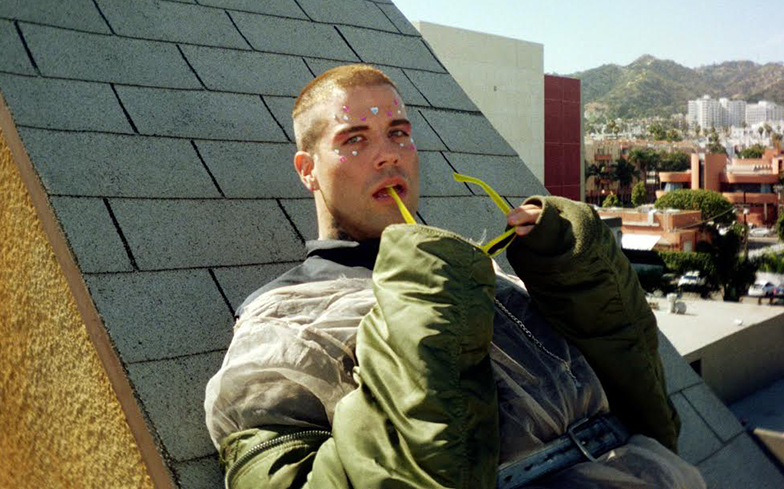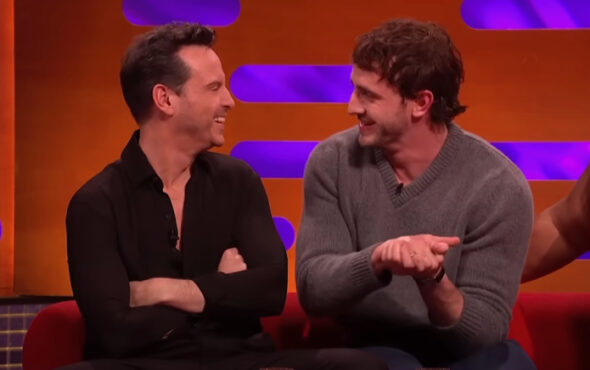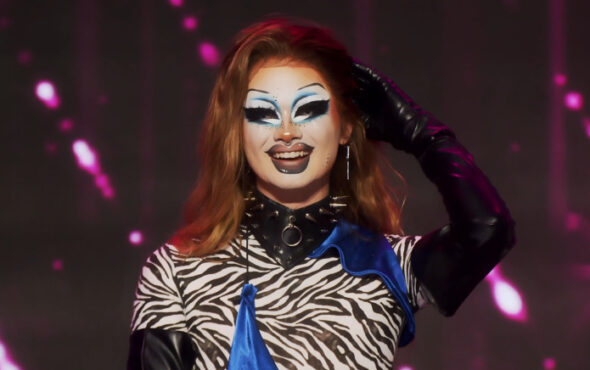
“The queer experience is so universal. Even if you don’t identify sexually as queer, there’s something inside of everybody who has felt completely ostracised or like an outsider.”
After writing songs for close friend Brooke Candy’s critically-acclaimed debut EP, Jesse Saint John made a name for himself in the songwriting industry when be penned several incredible pop tracks for artists such as Britney Spears (Love Me Down), Charli XCX (Cloud Aura, Secret, I Got It) and Camila Cabello (Something’s Gotta Give).
Like several other talented songwriters in the world of pop – Lelend, Bonnie McKee, Chelcee Grimes – Jesse has decided to launch a solo attack on the charts with the release of his two fantastic pop-bops, Move and Fake It – which will be followed by his first EP later this year.
We caught up with Jesse to talk about his solo career, the importance of straight allies for the LGBTQ community, and why he’s made it his mission to punch and spit on his fans. You’ll understand that last part later.
How are you Jesse?
Good! Sorry, when I talk to people with accents, sometimes I do an accent. Like, in and out.
Go ahead! I don’t mind.
Yeah, but it always ends up quite Aussie.
Mine always ends up Russian.
Can you do an American accent?
What do you want me to say?
Okay, so this is the thing. A lot of people when they do American accents, they say something with a hard ‘r’. So they usually say like, ‘I love your hair’. So, say that.
I love your hair.
No! That’s always how people do it!
Okay, let me try again. I love your hair.
No! [Laughs]
I’m no Meryl Streep.
It was actually kinda good.
Well, when you’ve got talent, you’ve got talent.
Exactly! You’ve got a whole other career waiting for you.
I originally wanted to be an actor.
So did I actually.
Didn’t every gay boy?
Yeah, totally. Every gay person thinks they deserve to be famous. I did one play really good, and the rest were so bad.
The best performance I ever did was as the girl from The Grudge.
What kind of a play was that?!
I can’t remember, I was 12, but isn’t she every gay kid’s LGBTQ icon?
No, she really is. Every year, when I was little for Halloween, I wanted to be Morticia, or…
Samira from The Ring?
Yeah, an evil woman. Then, I grew up to become an evil woman.
I won’t be an evil woman for this interview. I’ll start off easy – how did you get into the songwriting industry?
I had a best friend and she wanted to be something, and so I wrote some rap songs for her, and we put them up on YouTube. We made videos for them, and she was Brooke Candy. From there, Sia emailed us, and then I started writing with Sia, and after that, I started doing sessions with a bunch of other songwriters.
Sounds terrible.
It’s the craziest story, that’s why it’s so funny when people ask me how I got into the music industry. I’m like, ‘I have no idea, I don’t know’.
‘One day, I got an email from Sia…’
The craziest thing is, we made her prove she was Sia before we met her.
How did she do that?
She sent a photo of herself [laughs]. I think it’s somewhere on some hard drive or something. We were like, ‘Oh, don’t we feel silly now?’
We’ve all done that on Grindr haven’t we?
I’ve never had Grindr, I feel like I’m missing a big gay experience.
The filth that comes out of these people’s mouths…
I have Twitter for that.
That’s true. Do you receive a lot of filth?
Like, sexually and just really evil tweets. I enjoy both.
What’s the most NSFW tweet you’ve ever received?
Tons of nudes, and a lot of filthy things. ‘Spit on me’, ‘Punch me’… Just very specific kinks, which I would never shame anybody for their pleasures, so I’ve made it my mission to find them so I can punch and spit on all of them.
I hope so. If they want it, you gotta give it to ’em.
Totally. I’m only here because of this.
Who were your icons growing up?
Britney Spears. I saw her 11 times growing up. I’m a massive fan. Then, Fiona Apple and Regina Spektor, Joanna Newsom, Cocorosie, a lot of alternative female singer/songwriters. It’s a bit of a mix. I love Basement Jaxx. I thought it was cool that all of their songs sounded different, but came from the same sort of energy. I was a massive music inhaler, but then I also love musical theatre because I’m a faggot. I loved Spring Awakening, and I auditioned to go on the professional touring production, and I got all the way to the very last cut, and I didn’t make it. I was devastated, and was like, ‘Well, that’s it, I’ve got to become an investment banker’. But yeah, musical theatre was very big for me, and still, to this day, I’m constantly listening to all the the things I grew up on like Rent, Spring Awakening, and Wild Party.
You mentioned Britney, who you ended up writing a song for [Love Me Down]. How was that?
It was everything I ever wanted. I was literally like, ‘Okay, so now I will retire, thank you so much’. I didn’t even know songwriting for other people was really like a job, I didn’t know how that worked at all. So, the minute that I found out that people were writing for other people and sending them songs and stuff, I was like, ‘Oh, I need to write a song for Britney Spears’. I wrote this song called Secret with SOPHIE, and Charli XCX ended up releasing it, but it was something that was originally of interest for Britney. So then I had to be like, ‘Secret is off the table’. I was told by Karen, in Britney’s camp, ‘Okay, so make a new song, a better song’, and it was the last song that ended up making the album. I still haven’t met Britney, which is so sad, but I will. I sent that song for her, and we got the vocals two weeks later, and then it was on the album a month later. It was the quickest turnaround.
How was it working with Charli?
Yeah, she’s one of my favourite artists, favourite people, favourite everything. My first cut that came out on a major label was Cloud Aura, which I co-wrote with Brooke Candy for Charli’s first album. We’ve just been friends this whole time, and we were able to collaborate again on I Got It on Pop 2.
I love both of those songs.
I’m a massive fan. If I never met her or knew anything about her, I would be a major major fan, so.
She’s one of the pop kweenz at the moment who isn’t necessarily number one everywhere, but she’s got a major fanbase, especially within the LGBTQ community.
Oh my god it’s insane. Number one on the charts is so political, like, it’s so much to do with more than people actually listening to the song, y’know? It has to do with promotion, target ads, and putting it on Dancing With The Stars and all that. It’s sort of a plot to get that number one and if you don’t necessarily play that game, it’s a whole other route. There’s so many people that have these amazing careers and fanbases that don’t always have number one on the charts.
Even A-List artists like Beyonce haven’t reached number one in years, but everyone knows songs like Flawless.
Yeah, of course. There are certain songs that are in the cultural zeitgeist where the numbers don’t reflect its impact. You’re right. Even somebody like Lorde, and Charli… There are a few of those girls. Carly Rae. Everybody knows their songs and goes to their tours, and HAIM…
Kim Petras… Cupcakke…
Exactly! Yeah. Some of my favourite artists are not the ones that are… Well, they’re not The Chainsmokers.
Is there anyone you want to write for?
Lady Gaga. That’s the next one. I’m so happy with my discography, I’ve reached most of the people that I want to work with which is really nice. There’s some talks with Lady Gaga, and we’re trying to figure it out… That’s the next check mark that I need. It’s funny, because whenever I hear about a producer she’s working with, I kinda become friends with them.
What made you want to become a solo artist?
It was initially when I wrote the first song Move. I wrote it to give to somebody else, and then, the more I listened to it, I was like, ‘If I ever did my own artist project, this is what I would want to be in the world’. I could see myself proudly releasing this. It’s been really nice when I go in the rooms with different producers, and artists who say, ‘Why don’t you do an artist project? You seem like an artist’. I know that a lot of writers seem like artists as well, and then, this is sort of the first song where I was like, ‘I wanna do this’. I knew it would be fun for me to perform live, doing photo shoots and stuff. Move felt like my first single, and I made Fake It my next single, and I knew that I wanted to do this.
Will you be releasing an EP?
Yes, so I’m gonna do one more single, and then the three singles are gonna part of an EP.
Are there plans for a full length album in the future?
There are no plans right now. I think if you’re Drake, you can release an album and people will listen to every song. If you release an album, people will pick their six favourite songs anyway, and then four or five songs are dead and live on Spotify. So, it’s kinda like, just pick the six best songs and do an EP or that playlist or whatever it is. Then, the next EP or the next project can be the second half of the first album.
I’ve got a few deeper questions for you.
That’s fine. I can go deep.
How important is it to have queer perspectives in songwriting and music?
It’s so important because we are also listeners to music. We are consumers of music and pop culture, and for myself, I’ve always not felt represented in the media. I’ve always looked at things that were like, gay entertainment, and I was like, ‘That’s not really me, that’s not my gay experience’. Once there’s more queer filmmakers, songwriters and musicians, the more likely they are to reach an audience of queer, LGBTQ people and marginalised groups that they can identify with. I’ve seen so many people say to me, ‘There’s not anybody really like you’. There are other LGBTQ songwriters and musicians, but we’re all so different. There’s no reason why we can’t all co-exist. There should be more than one, two or three. People fear what they don’t know, so the more that we’re able to show the broad spectrum of what we can bring to the table, the more people are going to be accepting of who we are.
We have more openly gay mainstream artists now than ever. But there’s still not that many, why do you think that is?
It still feels so new. I choose to look at my queerness and otherness as my superpower, because it’s something that people don’t understand yet and they don’t understand that I’m able to channel it into something that is universal. The queer experience is so universal. Even if you don’t identify sexually as queer, there’s something inside of everybody who has felt completely ostracised or like an outsider. The more that I’m able to channel that energy, the more I’m able to relate to people who don’t identify with the queer experience, but they identify with that feeling of otherness.
Do you think it’d be harder to come out at the start of your career as opposed to later?
I think it’s harder if you come out later, because you have to reintroduce yourself in a way. I think if you’re gay from the start, people can galvanise behind you and be like, ‘Oh okay, he’s one of us’. It’s hard being gay either way. It is what it is. You’re either gonna be known as that gay singer, or you’re gonna be known as somebody who is gay but, ‘Oh they don’t seem gay!’ which is not better, y’know? I think adding that to your narrative is difficult in any way. But I think it’s harder if you come out later because you have to explain why you were hiding that part of yourself or why you were not able to express that part of yourself. Then, it sort of becomes this overlying narrative or whatever you do next. Gay fanbases are really loyal, because we have such a lack of representation in the media.
You took over our Instagram feed for Pride. What does Pride mean to you?
Pride to me is unity. It’s this loudness that we should carry on for the rest of the year. I did a bunch of interviews for Pride and stuff, and they’re like, ‘Isn’t it great how many allies we have?’ I was like, ‘Yeah, I like that, but they have eleven other months and 364 other days to be here for us too’. We need allies every day. We need people who are living the truth of our need for rights and representation and need for equality. So, Pride is this amazing culmination and celebration of how we should probably be every day. So when they’re like, ‘Isn’t it great how many allies come out here and enjoy the music with us?’, I’m like, ‘It’s also cool that queer people come together in this way’. I have a great sense of community, but I know a lot of queer people who don’t feel as supported in their own community. I think we are constantly making steps to be inclusive within our own community, and it’s amazing to me, the ways we can distance ourselves from our own community. I think it’s because a lot of times when you’re younger, you’re taught ‘Look, there’s not room for all of you, you’re part of a marginalised community’. If we all band together as queer people, LGBTQ people, POCs, people of marginalised backgrounds, we can make incredible progress. We don’t need outside approval. So, Pride is something we should do every day.
It’s like at school when you were the only gay person. If you met another gay person, you kind of felt threatened because you thought you were the only one? But then when you grow older, you realise you can co-exist.
Totally. I don’t know that saying, I’m so bad at colloquialisms, but I just know that it’s something like, ‘One rising tide rises all the ships’. What I’m trying to say is, if I’m doing well, then that means another gay person who is an amazing singer/songwriter who is wanting to get out there and perform will also do well, because I have been able to open a lane. I looked to people in front of me, who have opened a lane or made it easier for me, and I wanna be friends with them, and I think we should all be. I think we should be trying to be friends. If somebody does well, that doesn’t mean you’re doing worse.
Jesse Saint John’s first two singles, Move and Fake It, are available on iTunes and streaming services.





